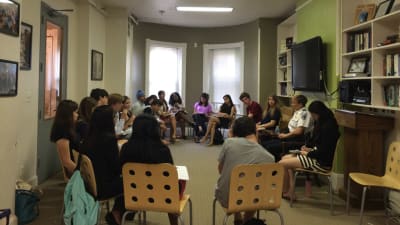Black, Blue, and All: Summer 2016 confronts violence toward and by police officers
The day after the Dallas police shootings we gathered our 20 SEGL Summer Institute students together after Morning Meeting and read them a series of challenging, conflicting statements:
“Black Lives Matter.” “All Lives Matter.”
“We should not rush to judgment.” “We have
more than enough information to make a judgment.”
“I do not feel comfortable discussing this here.” “Why would anyone feel
uncomfortable discussing this here?”
“This isn’t a big issue.” “This is the defining issue of our
generation.”
We asked them to reflect on these statements in their journals, and then left the floor open for the students to exchange feelings and ideas.
For 90 minutes, the students listened, cried, gently disagreed, and asked each other questions. At the end, we asked what voices were not in the room, considered that some might have had more weight to carry as a result, and had the students suggest speakers they would like us to invite in the coming weeks.
We closed by reminding the students that at SEGL, our goal is not to convince but to convene, and that ultimately it is up to each student to decide which views have merit and which views are worth meaningful attention. We also noted that this issue affects each of them in different ways, and that being attentive to these differences is one way to strengthen our community.
This is not the only (or best) way to confront the issues on today’s front page, but this is what we did.
At SEGL, we believe progress happens when students from many backgrounds come together and share ideas and experiences. When teachers prioritize their own beliefs in the classroom, progress can be stunted: it may provide emotional satisfaction for the teacher, but it silences and hardens those students who have the most to learn. (Yes, we know this is not a view that many teachers share, and that given the advantages some of us have, it is easier for some to think this way than others.)
As a result of student suggestions, we brought three speakers to SEGL. First, we met with Assistant Chief of DC Police Kimberly Chisley-Missouri. Chisley-Missouri is in charge of the Internal Affairs Bureau of the DC Police Department and, among other things, is in charge of investigating allegations of police misconduct. We also welcomed Natalie Ludaway, the Chief Deputy Attorney General of DC. Ludaway ranks just below the elected Attorney General of the District and is responsible for, among many other things, juvenile justice reform. Ludaway brought her Senior Counsel, Elizabeth Wilkens, with her.
All three of these guests challenged our students with the complexities of maintaining law and order in a just and equitable manner. They also helped them see how a powerful local government institution works. As African American women, each also drew on personal experiences of discrimination to help answer a persistent student question: how does one retain faith in institutions that, in the view of many, repeatedly fail the disenfranchised? They left the students both empowered and with better questions.
We are grateful for all those who choose to help young people wrestle with these awful issues. And we are grateful for those young people who are wrestling and who will lead the future. We have a lot to learn from all of you.






